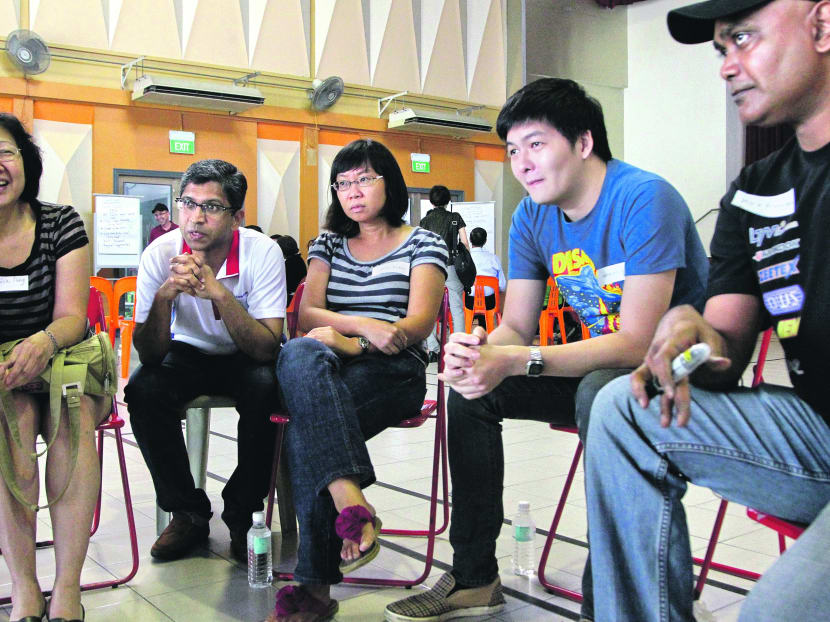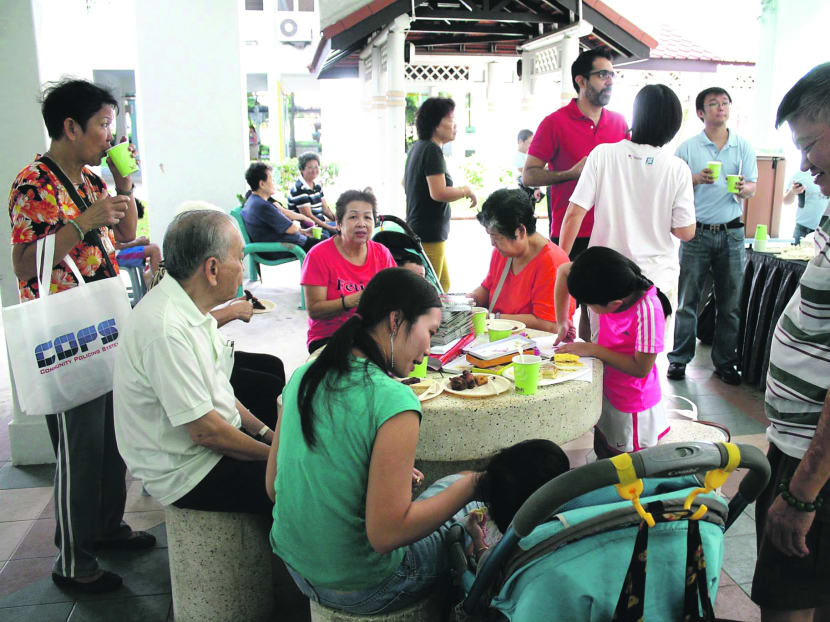MPs try out new ways to engage residents in changing landscape
SINGAPORE — From teh tarik sessions, roadshows and popping by coffee shops unannounced to mingle with residents, to mock Cabinet meetings where residents role-play as ministers, Members of Parliament (MPs) from both sides of the political aisle, including Cabinet members, are going the extra mile to reach out to their constituents.



SINGAPORE — From teh tarik sessions, roadshows and popping by coffee shops unannounced to mingle with residents, to mock Cabinet meetings where residents role-play as ministers, Members of Parliament (MPs) from both sides of the political aisle, including Cabinet members, are going the extra mile to reach out to their constituents.
In recent weeks, Law and Foreign Affairs Minister K Shanmugam, for example, has embarked on a series of roadshows titled Sharing with Shanmugam to, in his own words, “share the key messages” from the National Day Rally in August.
Fellow Nee Soon Group Representation Constituency (GRC) MPs Patrick Tay and Lee Bee Wah have also been pounding the streets — or more accurately, hanging around in void decks and coffeeshops — to engage residents face-to-face, beyond their Meet-the-People sessions.
Mr Tay organises teh tarik sessions at Housing and Development Board void decks or the constituency’s Community Clubs where residents walk in and sit in circles, listening to the first-term MP share his views as well as answer questions on national policies and local issues.
So far, about 30 to 70 residents have turned up for each session, said Mr Tay. “It serves as a good platform in a very informal manner,” he added.
Concurring, Workers’ Party (WP) MP Lee Li Lian, who holds quarterly tea sessions with her Punggol East residents, said such “less formal” settings encourage people to talk.
WP’s Aljunied GRC MPs also hold food and drink sessions with their residents in the constituency’s parks and void decks. Mr Pritam Singh, for instance, held a session on Aug 31 which doubled as an “education platform”. Representatives from the Singapore Police Force and the Cat Welfare Society were present to share initiatives and useful information, according to a post on the Aljunied GRC Facebook page.
At private estates, parties on the streets or in parks are also held by MPs — such as Marine Parade GRC MP Fatimah Lateef and WP MP Sylvia Lim — to bring them closer to residents.
While food and drinks are the common ice breakers, the engagement sessions come in various formats.
Last month, some 80 residents in Bishan-Toa Payoh GRC gathered at Thomson Community Club in a mock Cabinet meeting. Their MP, Mr Hri Kumar Nair, conducted a session where the participants were divided into six groups. Each group anointed a participant as “Prime Minister” and the rest role-played as ministers to debate on hot button issues such as housing for singles and the private tuition industry.
Mr Hri Kumar noted the benefits of such interaction. “Whenever you have group settings like this, it’s easier to explain the policy because (it’s) face to face. When you explain something, and when you talk about consequences and implications, it’s easier,” he said, adding that sometimes the messages do not get across when he talks about policies on Facebook or through speeches in Parliament.
‘MPs CAN NO LONGER JUST SMILE AND SHAKE HANDS’
The need for both People’s Action Party (PAP) and WP MPs to ramp up their engagement efforts can be attributed partly to heightened political competition and a more demanding electorate, analysts said.
However, for the PAP, there is greater impetus for a renewed push to connect better with voters, for a variety of reasons, including the setback in the 2011 General Election when the ruling party lost a GRC for the first time, they added.
Even before the 2011 GE, party leaders also spoke of the need to look for candidates who might not have stellar credentials on paper but who connect well with the ground. And the engagement is necessary not just to win votes — it is also crucial to the PAP, as the ruling party, in today’s political climate where policies have to be explained better, the analysts said.
When he announced changes to his Cabinet in August, Prime Minister Lee Hsien Loong reiterated that to complement structural changes in his administration — in response to the growing complexity of governance — there is a need for political leaders who can “do the political work” such as engaging Singaporeans, as well as “getting our views across and making sure we know how people are feeling”.
Singapore Management University law professor Eugene Tan noted that these days, Singaporeans see engagement “as a measure of their MPs’ commitment and ability” — whether they are assessing a PAP or WP MP.
Associate Professor Tan, who is also a Nominated MP, argued that there was a period in the late 90s where the job scope of MPs veered towards administrative tasks such as the running of town councils.
“This overlaying of an administrative role over the parliamentary and traditional constituency work meant that the latter two functions became less prominent,” he said. “This also meant that the PAP in their search for MP candidates preferred those with technocratic abilities or professional expertise, rather than those with grassroots experience and nous.”
Agreeing, National University of Singapore political scientist Bilveer Singh noted that political competition has “intensified” and the “image that the (opposition) is good on the ground” was also a factor.
He said: “What made the PAP the all-time winning party was because its MPs were from the people, for the people and most importantly, like the people. They were people the voters could relate with; ordinary Singaporeans who responded to a call ... Somehow, this is seen to be missing.”
He added: “Getting (candidates with) PhDs and super CEOs is not the answer.”
Former Nominated Member of Parliament (NMP) Zulkifli Baharudin, however, disagreed with the suggestion that prior to the renewed push, the PAP MPs had been less effective connecting with the ground compared to their predecessors. He said: “Over the years, quite clearly, expectations of MPs have gotten higher.”
Residents today demand more from their MPs. “You cannot just go and shake hands, smile and say a few words ... people want to have more substantive engagement with the MPs,” he said. Adding that the PAP is “determined to win back public support”, he said the outreach effort “reflects the desire on the part of the party to communicate more”.
THE NEED FOR PERSONAL TOUCH
As to whether the unconventional engagement initiatives will be effective, Institute of Policy Studies Faculty Associate Tan Ern Ser pointed out that the current political environment “entails a broader range of engagement approaches capable of reaching different segments” of constituents. “Otherwise, (MPs) run the risks of losing touch with some of the segments,” he said.
SMU’s Assoc Prof Tan reiterated that MPs “have to reach out to as many different groups as possible”. “There are no ‘right people’ to reach out to as such. Everyone is a ‘right’ person to reach out to,” he said.
He added that it is hard to gauge the effectiveness of these engagement efforts. Even election results are influenced by a variety of factors, he said.
In any case, “some engagement is better than little or no engagement at all”, he said. “It boils down to staking their ground, having a presence, and showing that they are dedicated MPs.”
On their part, PAP stalwarts said their approach to engagement has not changed over the years.
Ang Mo Kio GRC MP Inderjit Singh, who was first elected in 1996, said he has been organising monthly dialogue sessions with residents for the past 12 years. Nevertheless, he tweaked the format in 2011 — by organising some sessions under themes — to reach out to more people, he said.
Likewise, Mr Shanmugam, who has been an MP since 1988, reiterated that “working on the ground and reaching out is an essential part of the role as an MP”.
The feedback for his recent roadshows have been positive, he said. “It is not uncommon for them to share that they better understand the policies after these smaller dialogue sessions, especially the policy alternatives, trade-offs and constraints.”
TODAY sat in at Nee Soon GRC MP Lee Bee Wah’s breakfast session two Fridays ago. Over about one-and-a-half hours, which she also spent chatting with this reporter, several residents went up to her and made small talk. One engaged her in a discussion over the new “three-generation flats” that were put up for sale in Yishun.
WP’s Punggol East MP Lee Li Lian, who was the only WP MP to respond to TODAY’s queries, said that the response to her tea sessions has been “so far so good”.
Residents in various constituencies generally felt that their MPs’ engagement efforts were useful.
Mr Michael Poh, 33, who runs a chicken rice stall at Koufu food court along Tampines Street 44, said the monthly KopiTalk sessions organised by Tampines GRC MP Baey Yam Keng helped him to understand policy changes “to a certain extent”.
Nanyang Technological University undergraduate Nantha Kumar, 25, who attended Mr Hri Kumar’s mock Cabinet session, found the concept “novel”. “A lot of views were exchanged, some had different views, so we had a healthy discussion ... I learned some stuff, considering how most people in my group were parents, so I had a different view of things as well,” he said.
During the session, Mr Hri Kumar moved from group to group and joined in the discussions at various times. Fellow participant Florence Tay, 47, said that it was a good opportunity to meet her MP. However, she said she was a “little disappointed” that she was unable to spend more time interacting with Mr Hri Kumar. She added that she had also expected the MP to do more of the talking, instead of the participants.
As they continue to experiment and try out different engagement formats, PAP MPs reiterated the need to engage residents in person, beyond the Internet and social media, which have nevertheless become indispensible in a politician’s engagement toolbox.
Jurong GRC MP Desmond Lee, who was promoted to Minister of State (National Development) under the latest round of Cabinet changes, said that residents would contact him via email and Facebook. But he would sometimes arrange to meet them because online correspondences have “limitations” and lacked the personal touch.
Mr Hri Kumar said he consciously keeps his online postings succinct so that people will pay attention to them.
Adding that some issues are “too complicated to deal with in small bites”, he said: “I prefer face-to-face engagements. The discussions are more detailed and responsive, and it’s easier to understand and make myself understood.”









